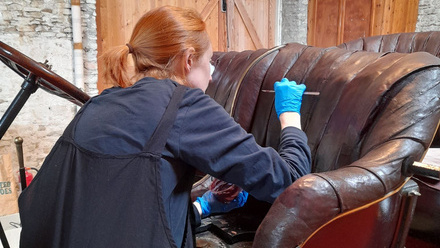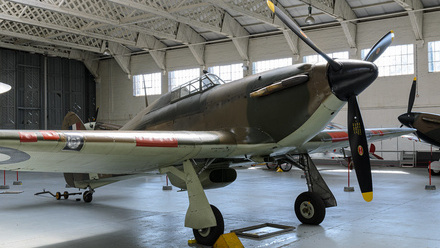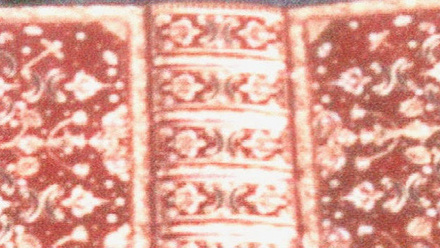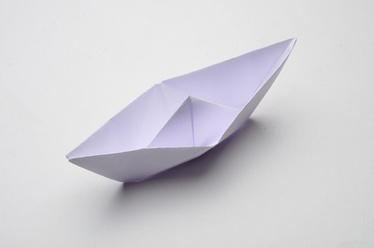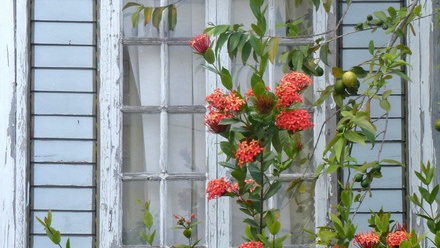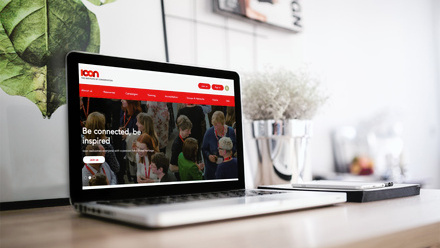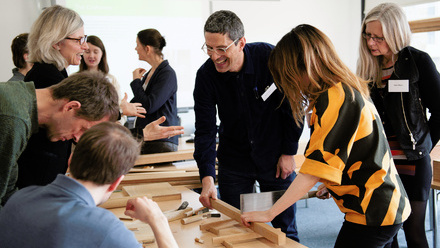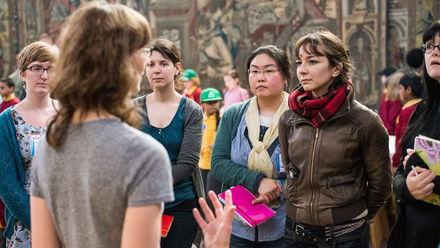This week is Pathway Week 2020, a week-long series of talks and virtual networking opportunities designed to support Pathway members in their continuing professional development and their journey towards becoming Accredited members of Icon.
Preventive conservator, Anna Zwagerman ACR was interviewed by Icon Mentor, Clare Meredith ACR about her experience of becoming an Accredited member of Icon. Through a wide-ranging, open and honest interview, Anna reflected on her Accreditation journey - from her first professional roles, through to joining the Pathway and ultimately becoming an Icon Accredited member in April 2020.
Read on to hear about Anna's personal experiences as well as her tips and advice for those looking to become Pathway members and start planning their own journey towards Icon Accreditation.
---
Clare: Hello Anna.
Anna: Hi Clare!
C: We’re speaking to each other from our homes during the pandemic lockdown, I’m just outside Edinburgh in South Queensferry and you’re in Perth, is that right?
A: That’s right.
C: I’ve been remembering that I first met you in 2012 when you came to the National Trust for Scotland (NTS) on a 6-month EU-funded placement (Leonardo Da Vinci intern) at Pollok House in Glasgow.
A: You got me that placement Clare! I had completed 5 years of conservation studies at the University of Amsterdam and during the 2-year professional doctorate phase I had an internship placement with the National Trust. My then supervisor Helen Lloyd ACR gave me several contact details of places to ask for further work experience placements and you were the first to reply!
C: And then after your placement at Pollok, you successfully applied for a 12-month Icon/HLF-funded internship in Aberdeenshire hosted by NTS, when you became part of the Collections Conservation Services team. Looking back now, how did that Icon/HLF internship affect the subsequent direction of your career?
A: Thanks to my Pollok House placement I found out about Icon’s renowned internship programme; I applied and after a successful interview joined NTS Conservator North, Fiona Butterfield ACR, for a full year placement. She was a brilliant internship supervisor and taught me so much. It started off slowly with a shadowing role, to gaining more independence and then working at properties on my own, to eventually leading on projects. I got so much out of it. After I finished my internship I started applying for jobs and Fiona encouraged me to start working freelance and actually gave me my first contractor job. Having been a sole trader for just over a year, an opportunity then arose for a Conservator North job-share with Fiona which I did for eighteen months.
C: Could I ask you, before we carry on through the timeline, to reflect on the qualities you think make a good supervisor for an intern?
A: Somebody who is really there for you, is involved with your work, who can spot what you can already do, and gives you challenges and opportunities that make you grow. Someone who can teach you new things, gives you the freedom to develop but to learn from any mistakes, who talks you through decisions and ways of thinking. Someone who has your back!
C: That’s a great summary! And I remember those years when you moved between freelance work and the job share with Fiona, but what happened next, how did your career progress?
A: Well then came a large phase of redundancies within NTS starting mid-2016, which affected all regional staff in Aberdeenshire. I went back to working as a freelance conservator for a while, plus I got a seasonal property job with Historic Environment Scotland. At that time I had a baby as a solo mum so I joined the Icon Scotland Group (ISG) Committee to stay in touch during my maternity leave. At the start of 2019 I moved to Perth to take up a position as Conservation Officer with Culture Perth & Kinross.
C: In addition to serving on the ISG Committee, was Icon part of your professional life in other ways? Were you a Pathway member?
A: I joined the Pathway in 2015, just after I started my job share with Fiona, with the specific intention of working towards Accreditation with the help of a professional Icon mentor. During my HLF/Icon internship I had attended an Accreditation Clinic, and in 2015 I felt ready to start the process of completing the application form.
C: At this point I’d like to congratulate you and, I know you’ve recently been Accredited! It’s a huge milestone professionally and I’m under no illusion as to the extent of work involved. Is there anything that prompted you to start your application, how did you find the experience of working with a mentor, and more generally what were your thoughts of the process?
A: Thank you Clare! It’s a huge achievement and took me just under five years to complete. Being Accredited is a big indicator of a conservator’s professionalism as well as recognition from your peers that your work is up to a high standard. I felt that, as I wanted to continue working as a conservator in the UK, it was an essential part of progressing my career. I could see that museum and heritage bodies value the Pathway and Accreditation as many of the jobs I was going for specified Accreditation, or working towards Accreditation, as a desirable requirement.
But looking back, overall I found it a pretty gruelling process! Before I started, my friend who is a paintings conservator talked me through her Accreditation. She said it was the most difficult thing she had done. In many ways I agree, because it is a huge amount of work to do on top of a busy career and the process of writing down projects didn’t come naturally to me.
My professional mentor was Christine Murray ACR and, when I wrote my projects as a narrative, she kept reminding me ‘don’t talk about what you did, talk about why you did it!’. I had to redraft several times and submitted my application twice to the Accreditation Committee (AC), the second time after having been advised to rewrite on account of not adequately evidencing areas of preventive conservation such as Environmental Monitoring, IPM and Risk Assessment; one project being too straightforward; and one where the project did not show a conservation outcome.
Christine thought there was still a lot of work to do on my first application before submission, and of course she was right, but I submitted it anyway because of the approaching deadline and my upcoming maternity leave. I then re-submitted the application during maternity leave with new projects, having received helpful advice and comments from both Christine and other conservators, even though I was again up against the deadline!
C: Did you think the comments from the Accreditation Committee (AC) were valid and helpful? Could you see why they were being asked of you?
A: Yes, absolutely. I thought the comment about my ability to demonstrate the impact of my practice through the project outcome was slightly unfair, because the outcome was influenced by changes in line management due to the NTS restructure at the time.
C: I’m now an Icon mentor and have been an assessor and served on the AC, so one way and another I’ve read a lot of application forms and understand the process from all sides. It’s crucial to establish the actual role of the applicant for each project, but the AC and assessors do recognise sometimes one has no control as to a particular outcome, for example if one is part of a team rather than having sole responsibility, and then especially if external circumstances change. Your frustration with that aspect is understandable.
A: It was accepted on the second occasion when I rewrote my application though.
C: Well that’s good to hear … did you find the discipline and the reflection of looking at your professional practice energising, or was it just a slog getting it all down?
A: I think it was just a slog! It really doesn’t come naturally to me to praise my own work and it can be so hard to self-reflect, and that’s what the Accreditation process asks of you. But I got there!
C: You certainly did. What were the qualities you valued in a good mentor?
A: Recognising what makes a good Accreditation project and getting helpful advice as regards expressing my work in terms of the Professional Standards. But it sometimes came down to language (and that might be because English isn’t my first language). For example, I wrote about carrying out ‘basic’ conservation treatments, and Christine advised me to change that to ‘general’.
C: I’ve heard many people say that they actually enjoyed their assessment day because they were well-prepared and could showcase their professional practice. Can you say that? What was your experience of the assessment day?
A: I do think that it was enjoyable, in terms of being able to show off my projects and what I had achieved, but the main thing I felt was complete exhaustion by the end! It’s similar to a job interview but lasts all day and is really intense. It was fortunate that I got on with my assessors, and that can make for a good job interview as well if you have a laugh over something, or just a bit of banter.
C: Yes, if you can do that on your assessment day it can be a sign you’re confident and on top of the material you’re presenting, and that’s encouraging for both parties. For assessors, it’s a good feeling getting the best out of the applicant and, invariably, assessors find assessment days really interesting and often very uplifting.
A: Well, that is nice to hear.
C: Do you have any top tips for managing the assessment day?
A: Yes, take the lead on your assessment day! I was given this advice by Mel Houston ACR that it’s your day so you draw up the timetable, showing the locations where you’ll be and at what time, and approximate timings for presenting each project. It’s more work but it’s worth it. Choose your assessment location wisely and, if necessary, postpone the assessment until you’re comfortable that you can show off great projects. I prepared a separate folder for each project I submitted, for easy reference during the assessment.
C: I echo that advice: it’s your day and you control the timetable and agree it with your assssors - you take control of everything. And that gives assessors confidence from the outset that the day has been well thought through. So now, Anna, thank you very much, are there any final comments you’d like to add?
A: Thank you too Clare! You’ve referred to the unprecedented times we find ourselves in which significantly impact on our sector. Icon’s responding brilliantly, and there are many online events being organised by different groups, which is great for CPD, although I would say a 7 pm start time is not helpful for parents managing bedtimes! In light of my earlier comment about a project where I had no influence over the outcome, I’d like to think that ACR applications and CPD reviews will be considered in the light of current circumstances which affect everyone’s working lives. We are all worried about the future, but fortunately conservators are an inventive lot!
C: That’s a fair point Anna and we are after all having this conversation in the middle of disruption and uncertainty … but what advice do you have for those who are either thinking of becoming Pathway members or who are about to submit their application for Accreditation?
A: First for those thinking about it, I would say go for it if your professional future is to practise as a conservator. Definitely do it and start preparing now: thoroughly understand the Standards and think about them when you’re planning or carrying out your work, as everything you do could potentially be part of an Accreditation project. It’s a great way to show the world what you are capable of.
Think carefully about who you pick as your mentor and work closely with him or her, as well as other colleagues. I asked both Accredited and non-Accredited conservators to read through my projects and everyone came back with helpful advice. And of course don’t leave things until the last minute! I was working towards the Icon deadlines, but my mentor was really busy and I didn’t leave enough time to incorporate her feedback. So, set yourself a deadline well before submission, then you can incorporate all the feedback and have your Application read through again, for fine polishing. Talking to peers who had either gone through Accreditation, or who were in the same Accreditation round, was also really helpful, especially concerning the assessment day.
C: That feels like a good place to end this conversation: thoughtful and constructive advice from a recently Accredited conservator. Thank you, Anna.
Thank you to both Anna Zwagerman ACR and Clare Meredith ACR for such an open and honest interview. Sharing experiences and learning from our peers is so important - would you be willing to share your Icon Accreditation story? If you are, please email us.
2020 marks the 20th Anniversary of Icon Accreditation. Throughout 2020 we will be celebrating the successes of professional conservators and highlighting the impact that Icon Accreditation has had on the conservation profession and for the care of our cultural heritage.

